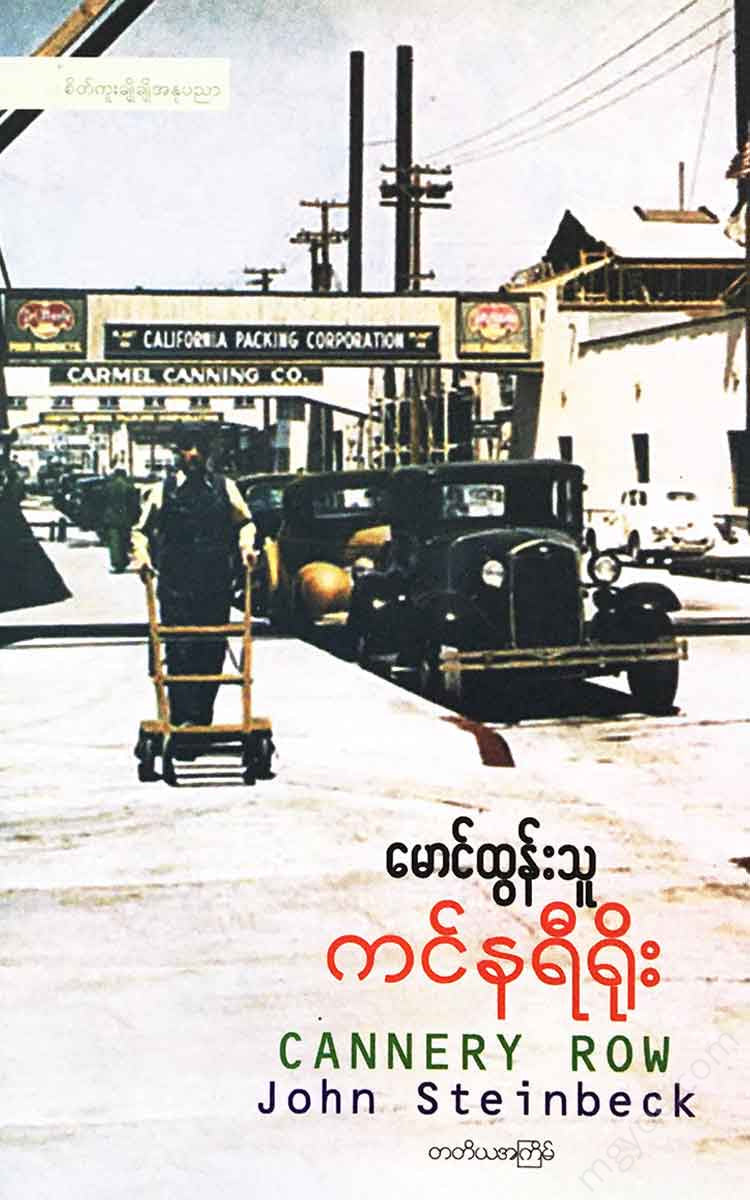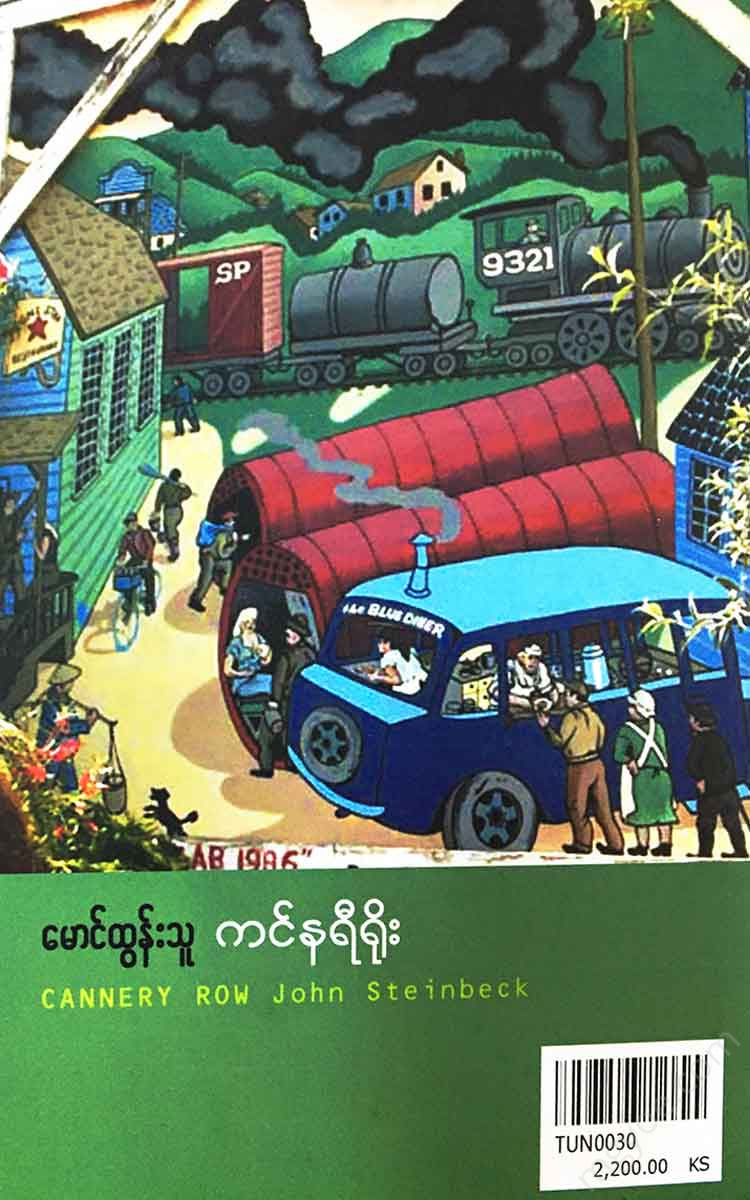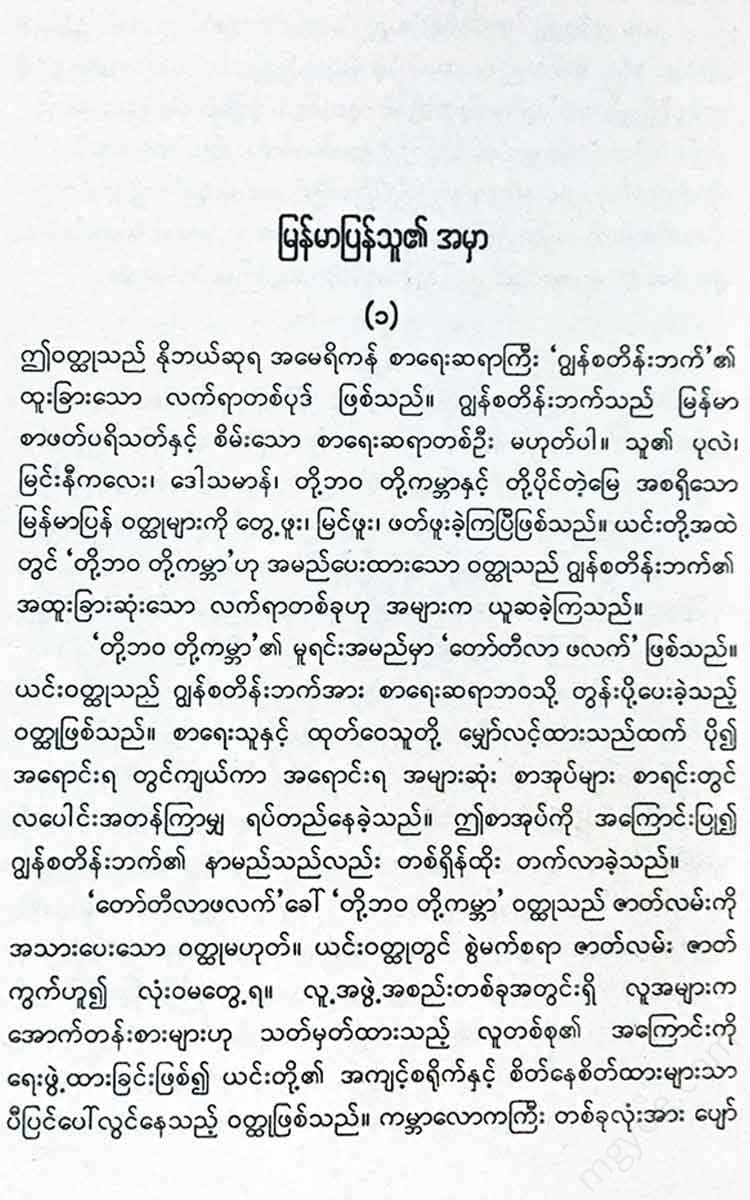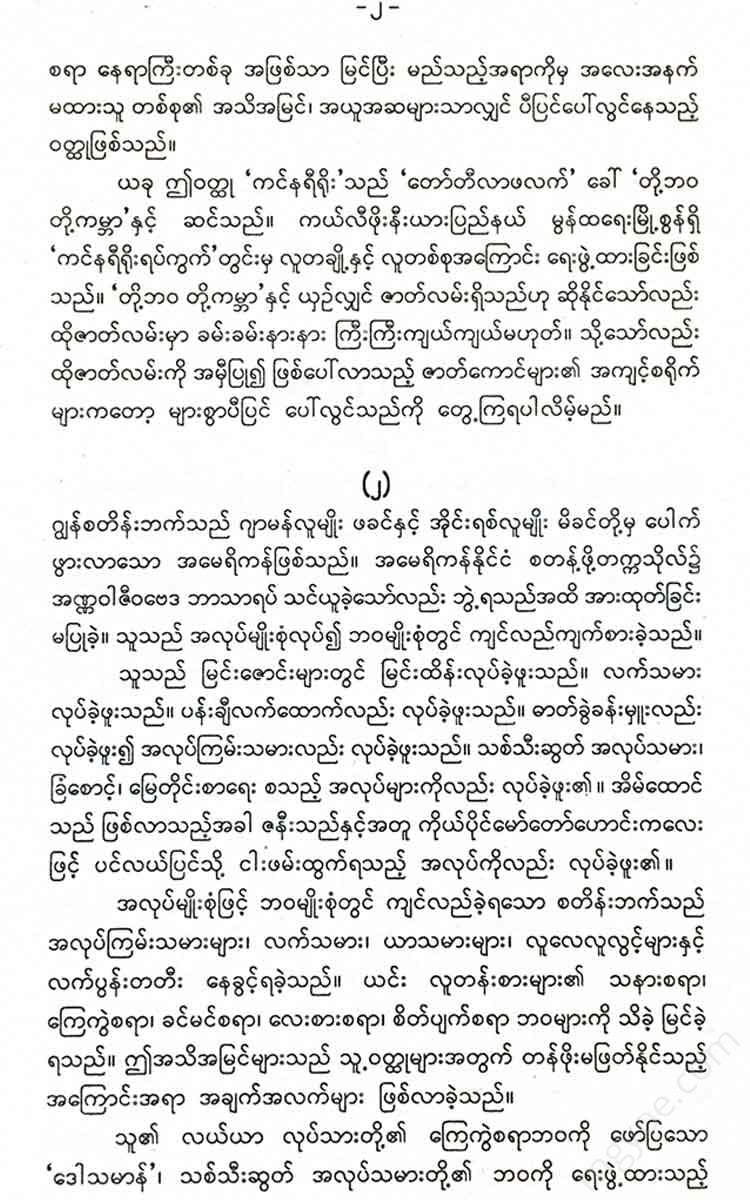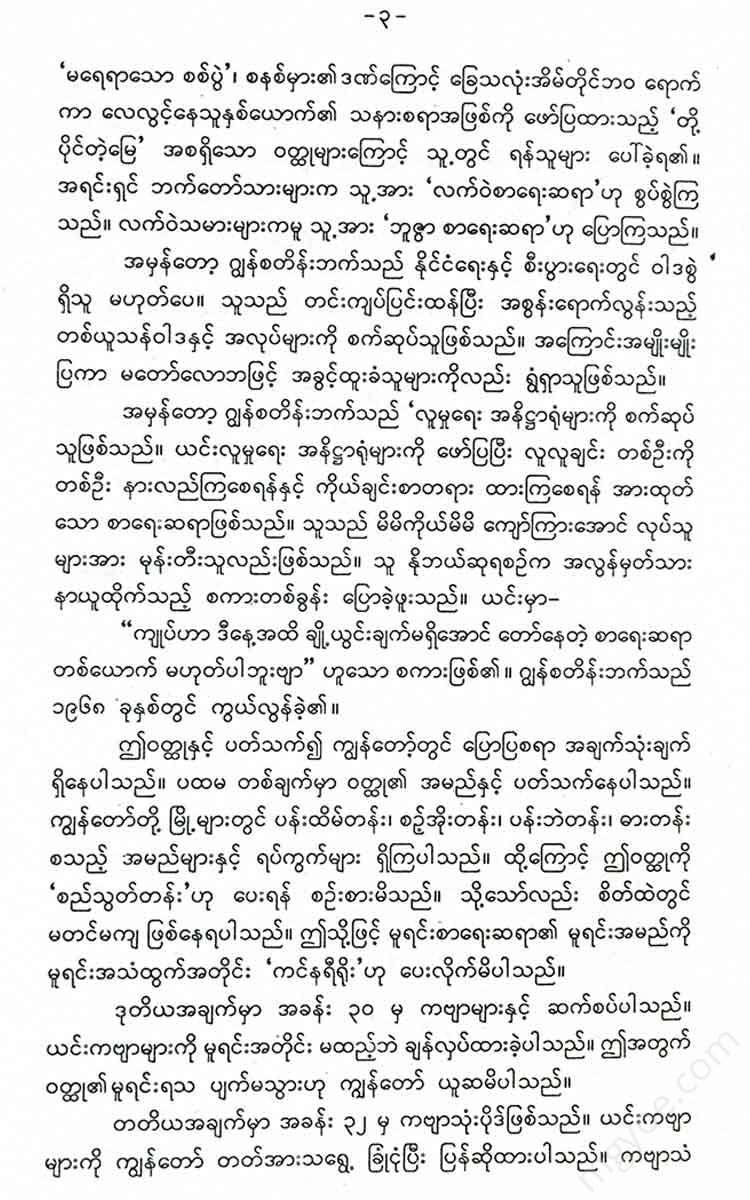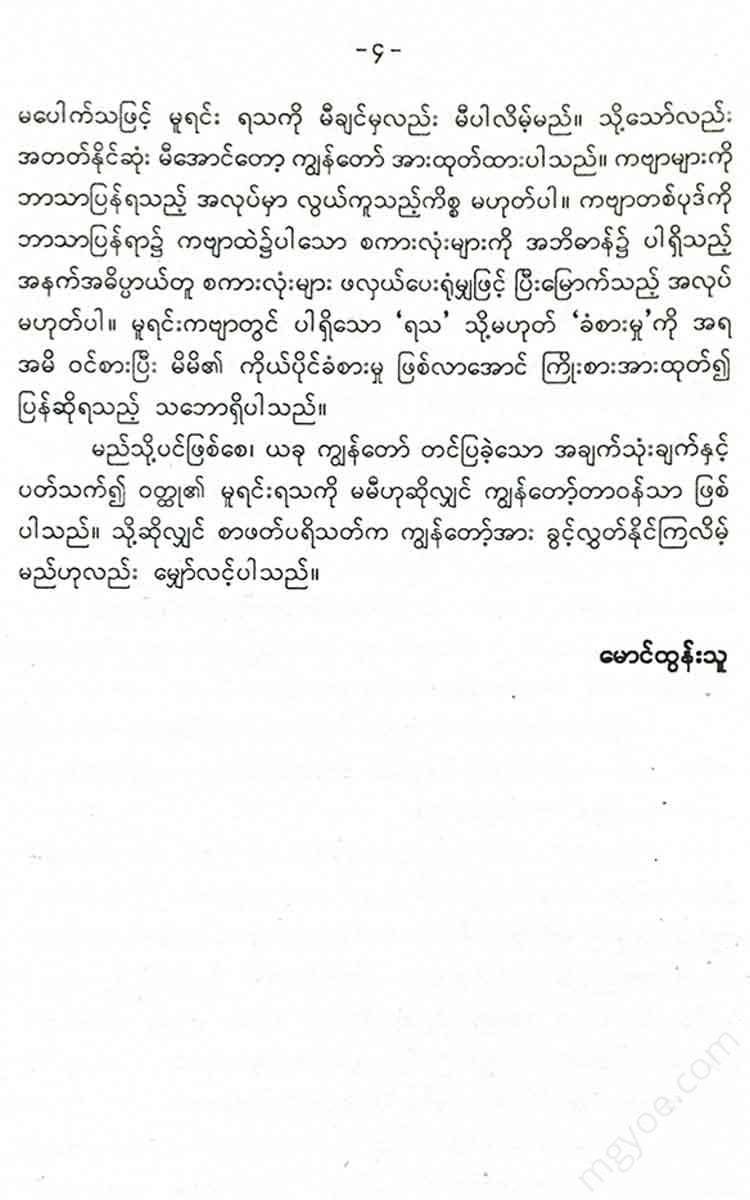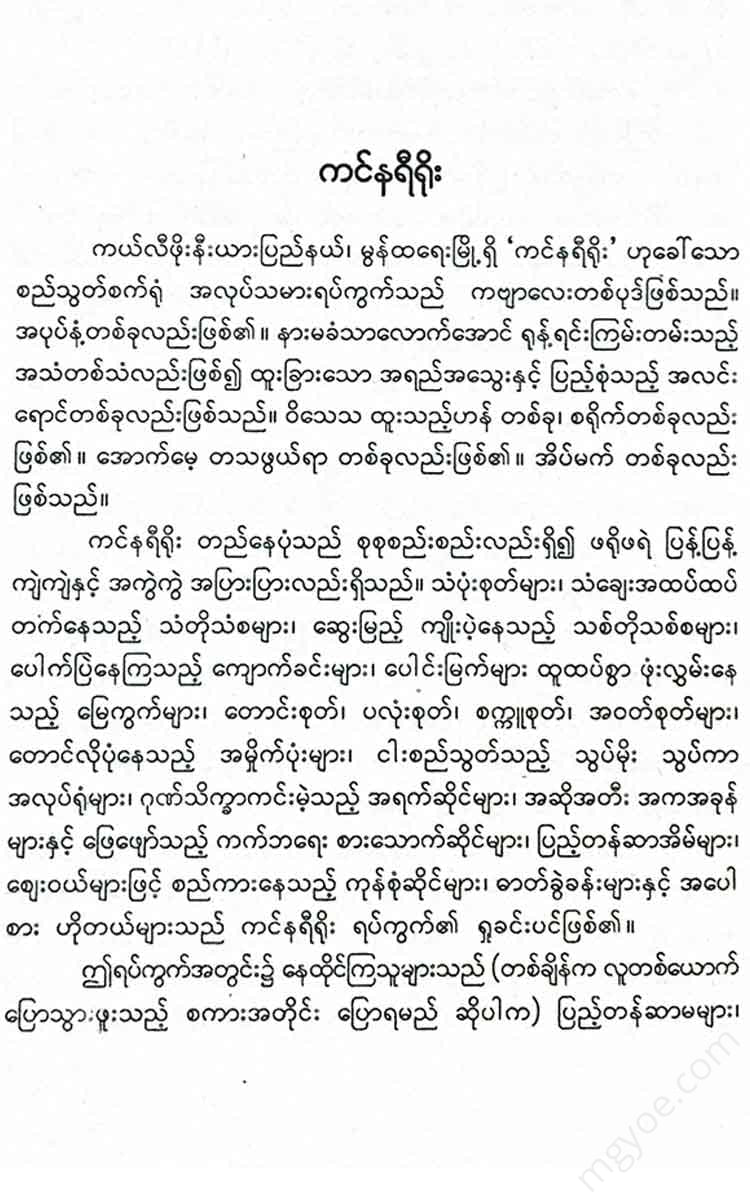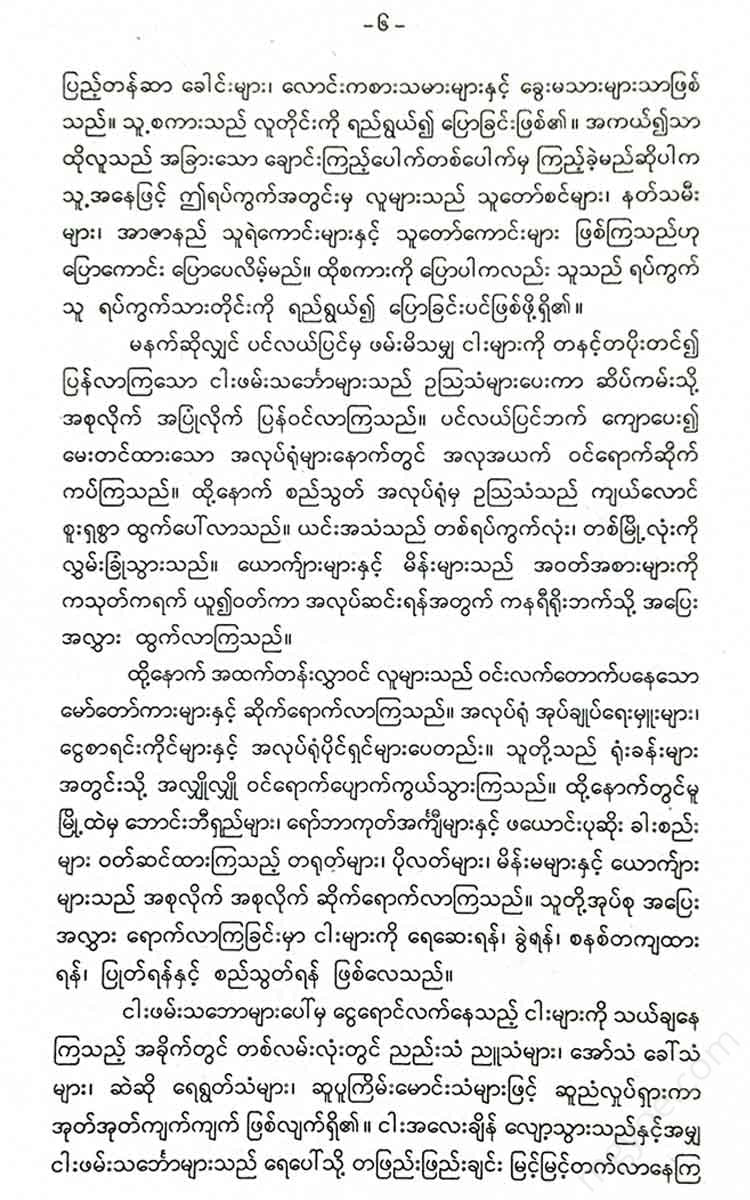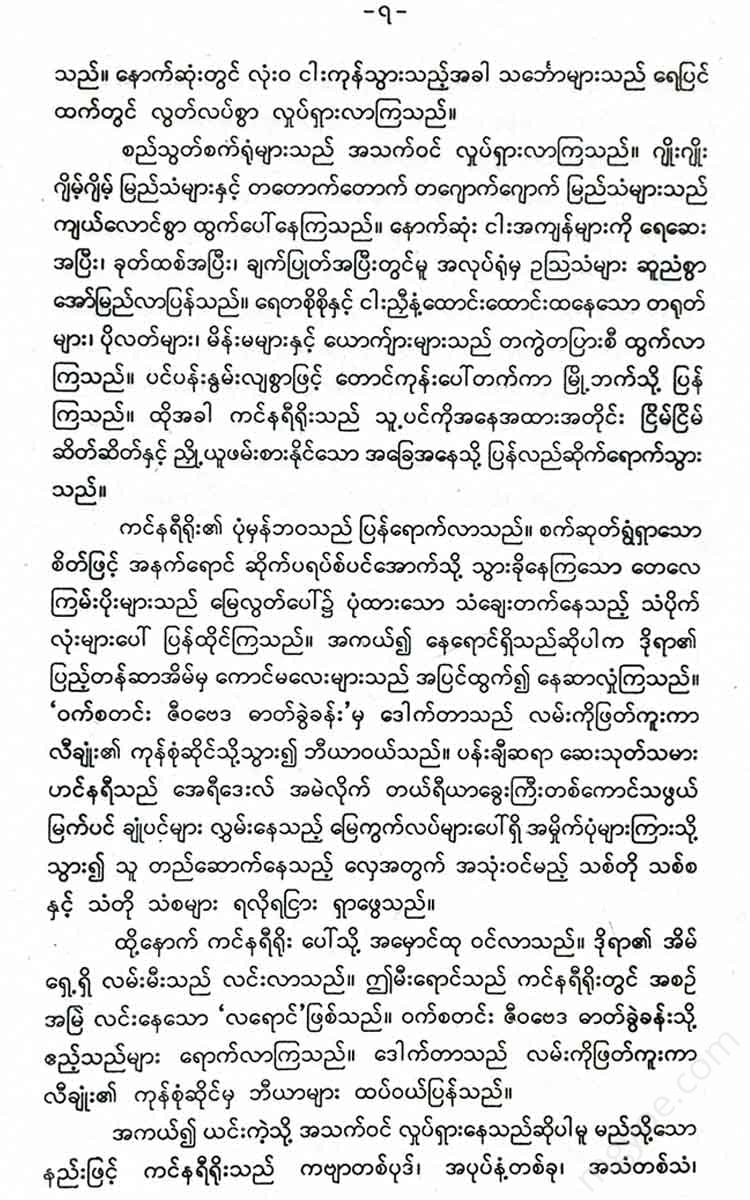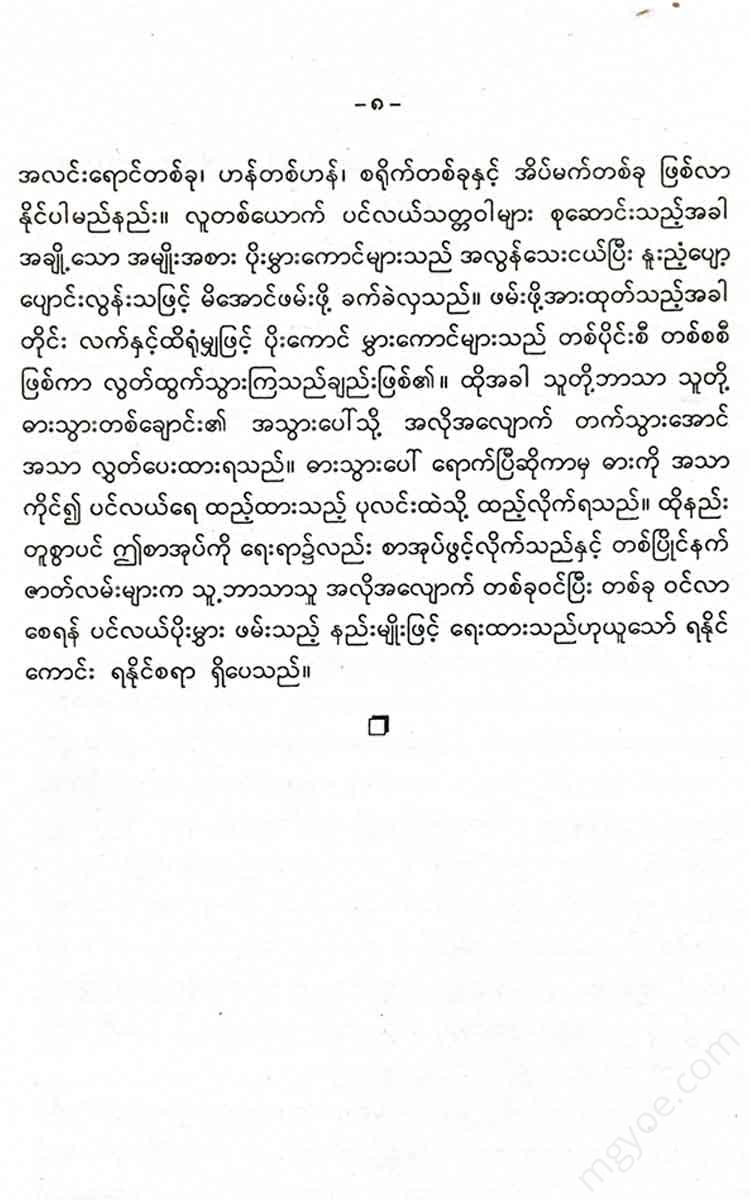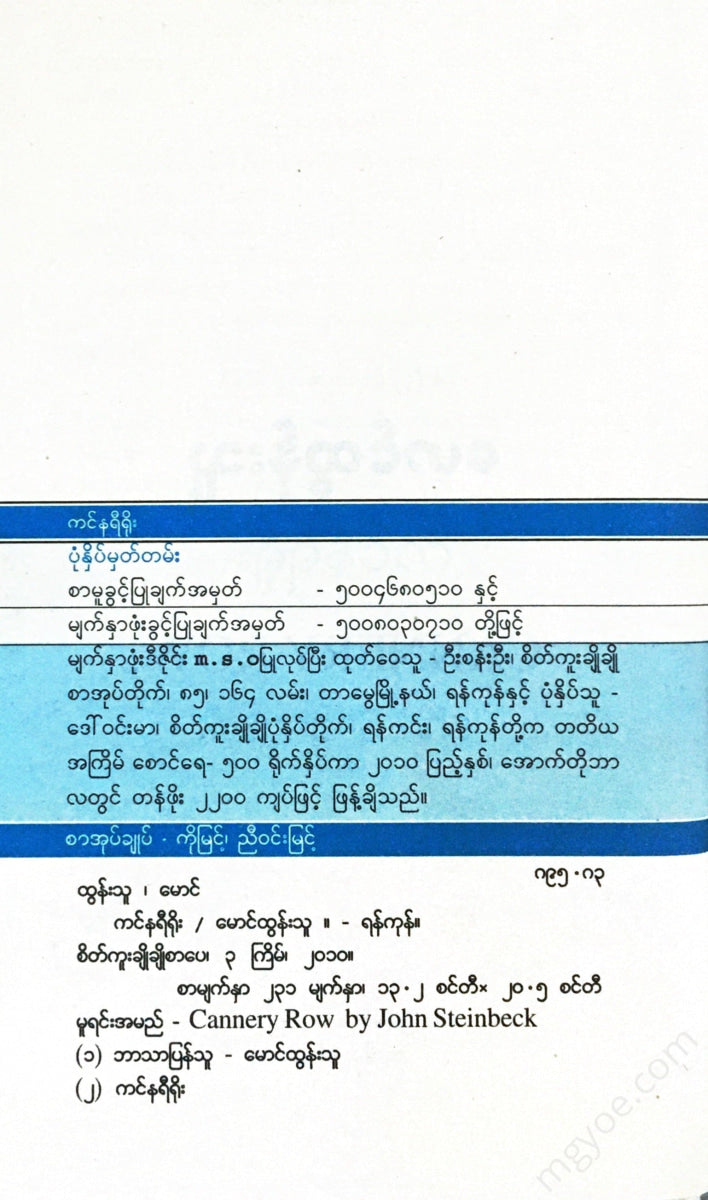စိတ်ကူးချိုချိုစာပေ
Maung Tun Thu - Canary Row
Maung Tun Thu - Canary Row
Couldn't load pickup availability
( 1)
Lee Chong's grocery store is not a standard store in terms of cleanliness, but it is a store that can be said to be a miracle in terms of the variety of products. His store is small and cramped. It is always full of customers. However, in the only room of the store, you can find everything you need to live and be happy. Clothing, food (from fresh meat and fish to canned fish), all kinds of alcohol and beverages, all kinds of tobacco, fishing equipment, all kinds of machinery, boats, ropes (for boats, motorboats, ships, and household ropes), hats, and hams.
You can buy flip-flops at Lee Chong's grocery store. You can buy silk kimonos. You can buy a single shot of whiskey. You can buy a single cigar. You can choose whatever you want and buy as much as you want. There is only one thing you cannot buy at Lee Chong's store:
The grocery store opens at dawn. At night, the last person to come in would buy a ten-cent coin worth of goods and then close the store. It wasn't because Lee Chong was greedy. He wasn't greedy. But he was just being ready for someone who wanted to spend money.
His position among the people in this neighborhood was a great surprise even to him. For years, everyone in Canary Wharf had been his confidant. He owed money to everyone. He did not force his customers to pay him. However, when the debt became too great, he stopped paying them. Then he would walk up the hill and go home without having to beg. His customers would come to him and pay him what they owed. Or try to pay him.
Lee had a round face and was very polite. He was friendly and easygoing. He could speak English fluently without any accent. When Chinese gangs were fighting each other in California, Lee noticed that the price of his head was rising. Then he quietly went to San Francisco and stayed in the hospital until the incident was over.
How did Lee spend his money? No one knows. He probably did. His wealth was only recorded on the books. In any case, he lived modestly and was treated with respect by his neighbors. He trusted his customers completely until he was no longer trustworthy. Sometimes Lee made mistakes in his business and lost money. In those cases, when he had no other choice, he would look for the positive and calm down.
In the grocery store, Lee Chong's seat is behind the tobacco counter. The money box is on his left and the Chinese abacus is on his right. In front of him, a glass cabinet holds a variety of cigars and cigarettes. On the shelves behind him, a variety of whiskeys, both fine and cheap, are lined up.
Lee Chong never stood between the whiskey counter and the shop without a good reason. Some shoppers wanted to buy goods from other parts of the store. When asked about it, Lee never got up and sold. He had his cousins, nephews, sons, and daughters-in-law ready to serve the customers' desires throughout the store. He never left the tobacco counter, and the top of the glass cabinet where the cigarettes were kept was his desk.
Li Chung always rested his big, chubby hands on the glass of the wardrobe. His big, chubby fingers were never still. They were always moving like sausages. The stone ring on his left ring finger was constantly rubbing against the rubber plate on the glass, and over time, the rubber plate became scratched and pitted.
Li's mouth is slightly open. Every time he smiles, his gold teeth shine brightly. He wears glasses that are both near and far. He usually looks at everything through these glasses, but when he wants to see far away, he tilts his head back a little. When calculating the profits and losses of his business, he uses his ever-shaking fingers to push and count the abacus on a Chinese abacus. His brown eyes wander around the store, showing off their golden teeth when they see customers.
One evening he stood in his seat (he had spread out some newspapers to keep his feet warm) and thought back with both joy and sorrow over a transaction that had been completed that afternoon and an event that had occurred since that transaction had been completed.
Leaving Lee Chong's grocery store, you cross a patch of grassy land and pass over old rusty pipes from canning factories, where you will find a footpath through thickets of bushes. Follow this path, past a cypress tree, and across the railway tracks, to a long, low-roofed building. The building has been used as a warehouse for fish meal for many years.
The building was a one-room store. The owner was Horace Abbeville. Horace had two wives and six children. Over the past several years, he had bought all the necessary goods from Lee Chung on credit, with a twist of coaxing and a twist of pleading, and had become the richest grocer in Monterey.
That afternoon, Horace arrived at the grocery store with a gloomy expression on his face. He looked at Lee's stern face with a hesitant expression. Lee was tapping the rubber band with his finger as he walked. Horace placed his palms on the tobacco counter and said, "I think I owe you a lot."
The gold teeth in Li's mouth flashed. He recognized in his heart that this was different from the words he had heard about the dragon before. He nodded with a calm expression and listened to the next round of words.
Hoss licked his dry lips. "I don't want to see my kids hanging around in front of the store anymore," he said.
"You're not selling them any candy or gum anymore, are you?"
Li Chong's face admitted that Ho Sen's words were true. "The debt is too much," he said.
"You know the building I own across the street, right? It's where the fishmeal is stored," Horace asked.
Li Chong nodded. Isn't the fish powder in that building his property?
"If I give you the land, can I pay off the debt I owe?"
Lee Dong’s head tilted back a little. He stared at Horace for a moment. His right fingers moved the Chinese abacus back and forth. He calculated the value of the dilapidated building and the land. He also took into account the land price that would increase if a canning factory expanded. When he finished calculating, the word “Rapley” came out of his mouth.
"Okay. Then I'll cancel the debt. I'll give you the contract to sell the land."
"No need to be a scoundrel"
They struck up a deal. Lee offered Horace a drink. Horace then said goodbye to Lee and left the shop. He crossed the road, past the cypress trees, followed the sidewalk, and entered his building. He stood on a pile of fishmeal and shot himself dead. Although he had no involvement in the incident, Horace's children (by whatever wife they were) were no longer able to eat sweets and gum easily and in large quantities.
That evening, Horace's body was embalmed and placed on a makeshift bier. His wife and he sat together on the steps of the house, hugging each other. (They remained close until Horace's body was buried, but when the matter was over, they separated the children and never spoke to each other again.)
Li stood behind the cigarette cabinet, his brown eyes calm. He felt a kind of Chinese sorrow in his heart. He knew that there was nothing he could do about this. But he felt sorry for himself, thinking that if he had known the truth of the situation earlier, there might have been a way to help Houzhen.
In any case, Lee understood that a person's right to commit suicide was not something that could be forbid or destroyed by strangers. However, sometimes a good friend could help prevent it. Now it was too late. He could only help in whatever way he could. He had already arranged to help with the burial of Hoshen's body. He had also sent a basket with food and drink for the family he had left behind.
Now Lee owned the Abbeville building of Hoshens, and the building, which had only two windows and a door, had a good roof and floor. It was filled with a pile of fishmeal, and it smelled musty. Lee considered whether the building would be a good place to store his groceries or a warehouse. He immediately dismissed the second idea. It seemed too far from his shop.
As he was pondering this problem, the door to the shop opened and Mack came in. Mack was a middle-aged man. He was neither married nor wealthy, and he was the leader and exploiter of a group of people who were content with whatever they had, unable to afford anything except food and drink.
Mack is a strong and energetic young man, with Hazel, Laida, and Eddie, the bartender at the shop. He lives among the rusting iron pipes on the plot near Lee's shop, along with a small group of people, including Hughie and Jones, who occasionally catch frogs and cats and sell them to the Westin Biology Laboratory. They live among the pipes during wet weather, but in fine weather they take shelter in the shade of the cypress tree at the top of the plot. At such times, they stretch out their legs under the shade of the tree and enjoy the lively activity of the canary.
Lee Chong stiffened when he saw Mac come in. He followed Mac into the store, one by one, with Eddie, Hazel, Hughie, and Jones among the crowd, making sure to check the merchandise inside.
Mack stood in front of Lee.
"Here... Lee, me and Eddie, and all of us. I heard you bought the Abbeville property, right?"
He asked.
Lee nodded.
Share
